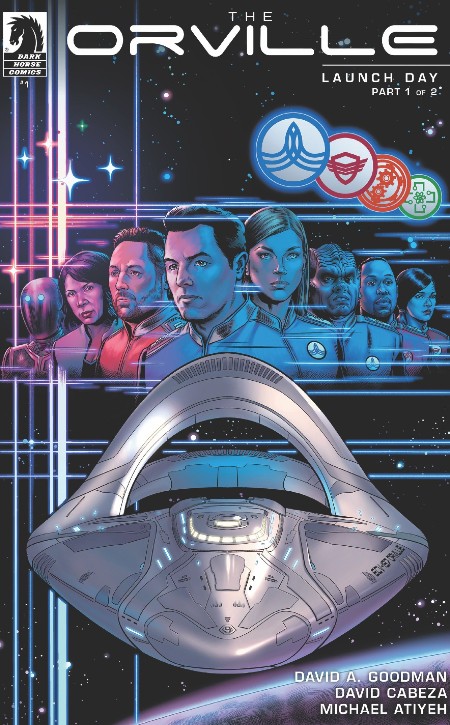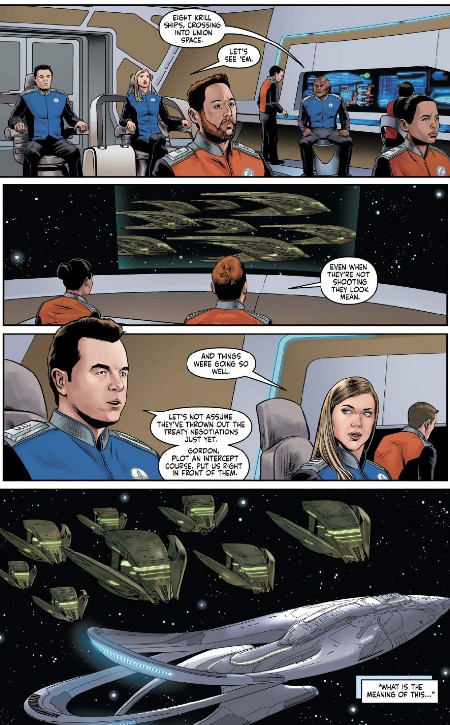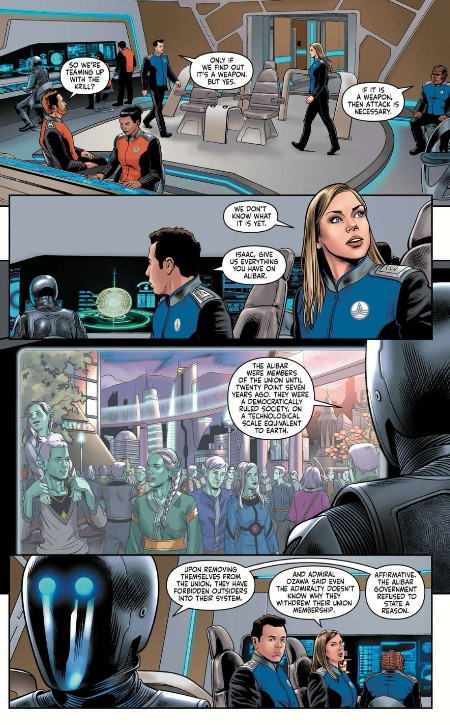
One of the most delightful surprises of the recent sci-fi cohort of Peak TV has been the emergence of The Orville, Seth MacFarlane’s irreverently affectionate look at what an alliance of Federation-like planets might be like with more whimsy, biting oneliners and a sense of the ridiculous.
With its third season pending, this time on Hulu rather than on Fox itself, The Orville is a show that over wo rapidly-improving seasons has shown that it is possible to both parody and pay homage to the ideals of Star Trek, a tricky balance to get right but one that the writers of the show have shown an increasing knack for getting right.
What has proven most refreshing with The Orville, and this is said with full acknowledgement of how much this reviewer loves Star Trek and its many incarnations, is how good it has been to see people being people.
While the starry-eyed idealism of show like Star Trek: The New Generation was and continues to be a tonic for a world weary soul, upholding the idea that humanity might one day break its cycle of poverty and self-destructive violence, it has always felt just a little too squeaky clean to be wholly relatable.
(This, of course, stands in marked contrast to other shows like Deep Space Nine, Discovery and Picard which take a deep dive into the flawed, if well-intentioned, contrariness of the human soul.)
As we wait for The Orville season 3 to make its idiosyncratically more sophisticated storytelling than you might expect presence felt, Dark Horse Comics have released a two-part comic series, “Launch Day”, which illustrates both the strength and the weaknesses of the show’s approach.
Featuring writing by David A. Goodman, art by David Cabeza and colours by Michael Atiyeh, Launch Day is a classic The Orville storyline in which the planet Alibar, now in the hands of democratically-elected xenophobic extremists has made the decision to leave the Planetary Union.
It’s a sorrowful situation which takes places twenty years ago before the current timeline of the show, with far lower on the run and younger Ed Mercer (played on the show by Seth MacFarlane) and his friend Gordon Malloy (played on the show by Ed Grimes) having to farewell valued fellow crew member Ycil who has been recalled home following Alibar’s decision to pursue an avowedly isolationist policy.
Fast forward twenty years and Captain Ed Mercer is aboard the Orville, a mid-level exploratory vessel when the Planetary Union’s most trenchant enemies, the Krill, enter the Union’s space on their way to Alibar which they say has a weapon capable of destroying the universe as everyone knows it.
Those there are alarming words but it turns out it’s all just fevered speculation based on some weapon-like readings and so Ed, after talking the Krill down from their religiously-influenced high horse and getting permission form the powers that be at the Planetary Union, heads to Alibar to find out if the planet is getting ready to take everyone out.
It turns out it’s not quite that simple and that what everyone is reading as a weapon powering up, may be something else entirely.

There is, with a storyline like that, a great deal of drama in the narrative, along with some deep musing about the way in which xenophobia and politically-motivated society-wide naval gazing can poison a place, and as an overall story it works quite nicely.
It helps too that the show’s trademark wit and banter is in place, especially in an ending which has a nice ring of you-get-what-you-wish-for sobering hilarity to it – as The Orville endings go, captures the show’s capacity for seriousness and silliness in one story perfectly – adding some levity to a narrative which leans heavily on the destructive effects of a fascist-like ideology.
And bleak the story often is on a world which drank the Kool-Aid and found it wanting but thus committed to the hellishness of their imbibing, had no real choice or so they felt but to double down on their embrace of xenophobic authoritarianism.
It’s definitely a tale for our times, as much as the 25th Century in which The Orville is set, neatly espousing the progressive ideals for which the show is known.
What is does lack is a substantial enough storyline.
While the narrative is good as far as it goes, and definitely keeps you hooked for the duration, it all feels a little rushed and surfacey at times, possibly due to the fact that a lot of story is trying to fit itself into just two short instalments.
Accompanied by lushly-coloured artwork which perfectly evokes the characters and the look and feel of the show, “Launch Day” is an enjoyable enough story that nails much of what makes The Orville so appealing.
It just feels all a little too brief and and with so much attention rightly paid to telling a sobering instructional story with a humourous sting in the tail, some of the humour and deep-diving exposition that would have enriched the show is lost (it’s a fate that has befallen some of the show’s on-air episodes which promise a lot but don’t quite deliver as fully as you might be expecting).
Still for all that, “Launch Day” is a lot of fun, with a thoughtful mind and progressive heart well in evidence that has just enough humour to capture the look and feel of a show that has always worn its beliefs, its heart and its sense of humour on its sleeve and which is proof that you can both intense and glib about your science fiction and still live to tell a very engaging tale.
